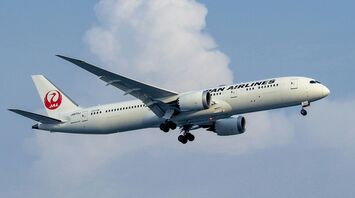Japan Airlines Unveils Plan to Introduce 42 New Aircraft from Airbus and Boeing

In a recent announcement following its board of directors meeting, Japan Airlines (JAL) revealed its ambitious plan to add 42 new aircraft to its fleet, comprising a mix of Airbus and Boeing models.
For its international operations, JAL will incorporate 20 Airbus A350-900 aircraft, which are already serving the domestic routes effectively. Additionally, the airline will integrate 10 Boeing 787-9 aircraft to bolster its fleet, particularly focusing on key markets like North America, Asia, and India. This strategic move aims to cater to the anticipated growth in these regions. By 2030, JAL aims to significantly expand its international network by about 1.4 times, emphasizing both full-service and low-cost carriers, while prioritizing the adoption of fuel-efficient aircraft to improve service quality and reduce CO2 emissions. The introduction of these new aircraft will be phased over approximately six years, commencing in FY2027.
On the domestic front, JAL plans to replace its current Boeing 737-800 fleet with 21 Boeing 737-8 aircraft starting from 2026. Additionally, to modernize its medium-sized Boeing 767 fleet, the airline will introduce 11 Airbus A321neo aircraft, marking the first-time inclusion of Airbus A321neo in its operations. These aircraft will be strategically deployed, particularly in routes centered around Haneda Airport, beginning in 2028. Furthermore, in response to the loss of an A350-900 aircraft in January 2024, JAL will introduce one additional Airbus A350-900 configured for domestic operations.
JAL's commitment to environmental sustainability is evident through its continuous efforts to introduce fuel-efficient aircraft. The airline aims to reduce CO2 emissions by 10% compared to 2019 levels by fiscal year 2030, with the ultimate goal of achieving near-zero emissions by fiscal year 2050.
The newly introduced A321neo by JAL boasts the latest technology, including efficient engines (LEAP-1A or PW1100G-JM) that promise a 15% reduction in fuel consumption and CO2 emissions compared to its predecessor, the A321ceo model. The aircraft's spacious Airbus Airspace interior ensures passenger comfort, while its advanced engines comply with the stringent noise standards set by the International Civil Aviation Organization (ICAO), ensuring a tranquil onboard experience.
With this strategic fleet renewal plan, Japan Airlines aims to enhance its operational efficiency, expand its global presence, and contribute to a more sustainable aviation industry.



















